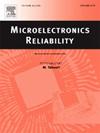Performance analysis of MTJ-based SNN under resistive open and short defects
IF 1.6
4区 工程技术
Q3 ENGINEERING, ELECTRICAL & ELECTRONIC
引用次数: 0
Abstract
Spiking Neural Networks (SNNs), inspired by biological neural systems, offer significant potential for energy-efficient artificial intelligence. However, implementing hardware-based SNNs using emerging devices, such as Magnetic Tunnel Junctions (MTJs), introduces vulnerabilities to manufacturing defects. This work investigates the impact of resistive open and short defects on the performance of an MTJ-based SNN through comprehensive circuit-level simulations. A fundamental SNN architecture was implemented, and targeted defects were introduced to evaluate network resilience under realistic operating conditions. Input spike patterns were applied to assess the network's ability to maintain correct functionality in the presence of these defects. Furthermore, the sensitivity of defective SNNs to timing variations within neuron integration and leakage windows was explored. Our findings demonstrate the critical influence of manufacturing defects on SNN reliability and provide quantitative insights into the relationship between defect characteristics and network performance degradation. These results are essential for developing robust fault models and generating effective test vectors, facilitating the development of reliable and scalable hardware SNNs.
基于mtj的SNN在电阻性开路和短路缺陷下的性能分析
受生物神经系统启发的脉冲神经网络(SNNs)为节能人工智能提供了巨大的潜力。然而,使用新兴器件(如磁隧道结(MTJs))实现基于硬件的snn会引入制造缺陷的漏洞。本工作通过全面的电路级仿真研究了电阻性开放和短路缺陷对基于mtj的SNN性能的影响。实现了一种基本的SNN体系结构,并引入了针对性缺陷来评估实际运行条件下的网络弹性。输入尖峰模式被应用于评估网络在存在这些缺陷的情况下保持正确功能的能力。此外,还探讨了缺陷snn对神经元整合和泄漏窗口内时间变化的敏感性。我们的研究结果证明了制造缺陷对SNN可靠性的关键影响,并提供了缺陷特征与网络性能下降之间关系的定量见解。这些结果对于建立可靠的故障模型和生成有效的测试向量,促进可靠和可扩展的硬件snn的开发至关重要。
本文章由计算机程序翻译,如有差异,请以英文原文为准。
求助全文
约1分钟内获得全文
求助全文
来源期刊

Microelectronics Reliability
工程技术-工程:电子与电气
CiteScore
3.30
自引率
12.50%
发文量
342
审稿时长
68 days
期刊介绍:
Microelectronics Reliability, is dedicated to disseminating the latest research results and related information on the reliability of microelectronic devices, circuits and systems, from materials, process and manufacturing, to design, testing and operation. The coverage of the journal includes the following topics: measurement, understanding and analysis; evaluation and prediction; modelling and simulation; methodologies and mitigation. Papers which combine reliability with other important areas of microelectronics engineering, such as design, fabrication, integration, testing, and field operation will also be welcome, and practical papers reporting case studies in the field and specific application domains are particularly encouraged.
Most accepted papers will be published as Research Papers, describing significant advances and completed work. Papers reviewing important developing topics of general interest may be accepted for publication as Review Papers. Urgent communications of a more preliminary nature and short reports on completed practical work of current interest may be considered for publication as Research Notes. All contributions are subject to peer review by leading experts in the field.
 求助内容:
求助内容: 应助结果提醒方式:
应助结果提醒方式:


